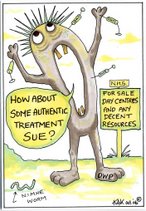
The deeper truth in all this tension between State and Therapy/Counsellor professionals UserWatch believes, is the State and the Patient (Users) in mental health together with those who truly advocate for them (rather than corral them for use) have been on a collision course for some time . The most acutely suffering User in crisis sadly may well be the easy candidate for no or little talking therapy and drug control but there are many more Users in mental health who are suffering long term relational damages and emotional aftermaths that are not getting a choice a therapy to help their feelings and even the need to mourn their shocking pain caused by perverse developments ...
They are left in a tight circle of defensive symptoms and then labelled without the narrative of their individual lives being the most informing thing about their condition ..Labels hide discernible and treatable history . That fact that hyper damaging history can be mourned over years is not a popular way with the State .
There is a war on for sure - it is fundamentally about the vested interests of psychiatry, the Uk Dept of Health , and the socially controlling establishments in psychology and other related health arenas staying in power and claiming "measurement and regulation" as the most responsible way forward whilst mixing this into a perverse discriminatory context of no real Patient Choice in Mental Health and no likelihood of a culture of that begining and becoming seriously informing ..
The war by default is about keeping human feelings and the social realities that damaged them out of sight and mind . Integrating these feelings though through sense and help is not what the State wants and a cost argument is often used yet the false economy of one size fits all CBT and CCBT is coming under increasing professional scrutiny and argument .
The patient - User is in the no-mans land of it all. Many are zeroed in on for zero help and that nothingness kills.
We have copied Psychminded's April 15th 2009 article here below (re : British Association For Counselling and Psychotherapy BACP ) regarding BACP's concerns over a lack of Patient Choice .
Therapists' anger at NHS "downplaying" of counselling and psychotherapy
April 15, 2009
by Angela Hussain
.......
Psychotherapists and counsellors are angry that the NHS is doubting the efficacy of counselling and psychotherapy for depression.
National Institute of Health and Clinical Excellence (NICE) 2004 guidelines on the treatment of depression prioritise CBT and interpersonal therapy for depression.
But the clinical advisory body also recommends counselling and psychodynamic psychotherapy for mild to moderate depression.
But NICE's new draft revised guidelines state patients should be explained about the "uncertainty" of the effectiveness of counselling and short-term psychodynamic psychotherapy for depression.
The British Association for Counselling and Psychotherapy (BACP) has accused NICE of unjustifiably "downplaying" counselling and psychotherapy and denying patient choice."While the tone of these statements does not inspire confidence in counselling and psychotherapy, the impact on choice of therapy is of major concern," said Lynne Gabriel, chair of BACP.
Dr Gabriel said the BACP would make a "robust" response to NICE.
She said: "In our response, we will question the rationale and methodology that informs the NICE downgrading of counselling and psychotherapy as therapies of choice for mild to moderate depression."

.jpg)







No comments:
Post a Comment